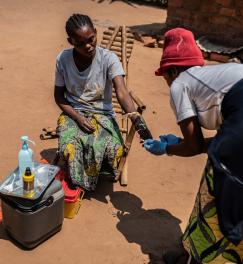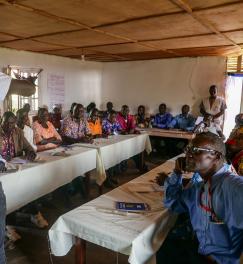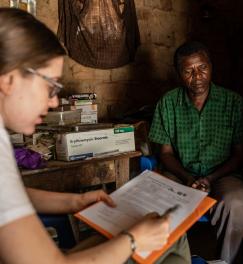Our approach to epidemiology
Epicentre conducts activities classified into three broad categories: field epidemiology, observational studies (descriptive or analytic) and interventional epidemiology. In addition to these quantitative approaches, Epicentre also increasingly conducts qualitative studies or mix-methods studies.
Interventional trials
Interventional studies are conducted to understand the effect of an intervention, whether this be a vaccine, diagnostic, treatment, care strategy or other intervention.
Epicentre has experience in a broad of trial designs such as cluster randomized trials in one or multiple sites, non-inferiority trials and equivalence trial, adaptive, and event-driven, designs among others.
Epicentre uses descriptive epidemiology (observational epidemiology) to define patterns of distribution and/or trends in health and disease over a given time period or location, or in relation to groups of people. This work facilitates health program planning and prioritization of activities.
Observational epidemiology
Observational epidemiology is used to collect information on events over time. Prevalence studies, cross-sectional studies, longitudinal case series, case-control studies, cohort studies, and diagnostic evaluations are examples of observational studies.
Epicentre uses descriptive epidemiology to characterize the distribution and/or trends in health and disease over time, place and groups of persons. This work can inform the planning of health programs as well as prioritize activities.
Approaches used by Epicentre:
- Prevalence studies;
- Diagnostic test evaluations;
- Longitudinal case series;
- Analytic studies;
- Prospective and retrospective cohort studies; and
- Prospective and retrospective case control studies.
Qualitative methods
Epicentre conducts qualitative research when it is important to understand socio-behavioral aspects related to health. In addition to the “what, where, when” questions of epidemiology, this method helps us answer the “how” and “why” questions, that cannot always be measured quantitively.
Field Epidemiology
Understanding ongoing health events; determining programmatic priorities and setting the research agenda.
Field epidemiology serves the core function of understanding ongoing health events in a population. It provides an evidence base for programmatic goal setting and can inform research agendas for more detailed epidemiologic analyses. As such it is a crucial element of Médecins Sans Frontières (MSF) activities in the field.
Field epidemiology includes surveillance; outbreak investigations; program monitoring and evaluations; support of health information systems (HIS); rapid assessments and providing advice and support MSF with respect to health data collection and analysis:
The aim of surveillance is to inform program teams to promote effective and efficient responses. Epicentre does this by systematically collecting and evaluating morbidity and mortality data, and other relevant health-related information. These data are then disseminated to those involved in decision-making. Although surveillance traditionally focuses on infectious diseases and mortality, Epicentre also extends its use to other relevant domains such as the tracking of injuries, chronic diseases, health clinic visits, water consumption, population movements, latrine use and other indicators. The information gathered may signal the need for further investigation.
Ideally, information from a surveillance system can enable the identification of a specific case or cluster of cases of a disease or syndrome. The ensuing investigation can range from a simple phone call to a full field investigation requiring the coordinated efforts of many people to characterize the extent of the outbreak and potentially determine a cause. Alerts from a surveillance system, media information, or alerts or rumors from the community can trigger such an investigation.
Epicentre conducts investigations to determine the nature and magnitude of an outbreak and implement appropriate measures to address it. Where appropriate, the outbreak investigation can include a research component if, for example, biological samples are stored for future or additional analyses beyond those needed to solve the immediate health problem, and/or if the data collected (available as part of the outbreak investigation itself or through additional specific data collection) allow examining risk factors.
Program monitoring and evaluation (M&E) at its core, are cycles of planning, action, and reflection.
Epicentre monitors MSF field programs by systematically collecting and analyzing information so that progress toward the achievement of objectives, outcomes, and impacts can be assessed. Results are sometimes incorporated into alert systems.
Monitoring activities often focus on parts of a program but can also encompass an entire set of program data. For example, determining the frequency of missed opportunities for vaccination among patients or participants monitors one aspect of that program.
When conducting evaluations, Epicentre considers the ways by which programs address problems and recommends improvements. It involves the periodic, retrospective assessment of a program, conducted internally or by external evaluators. For MSF, evaluations normally consist of assessments of the design or strategy, implementation, and results of interventions against established MSF or international standards, humanitarian principles, MSF policy, and country strategy.
Epicentre provides technical advice and support when MSF field teams or other staff members require the advice or temporary support of an epidemiologist. This can consist of a simple discussion about a situation in the field or a specific medical problem, but it may also involve a structured and deep review of data or other documents. Epicentre may underpin this work with mathematical modeling to generate hypotheses, make projections, and clarify options for decision-making.
Ethics
Find out more
Clinical trial policy
Find out more
Training
Find out more
Population health assesments
Find out more






